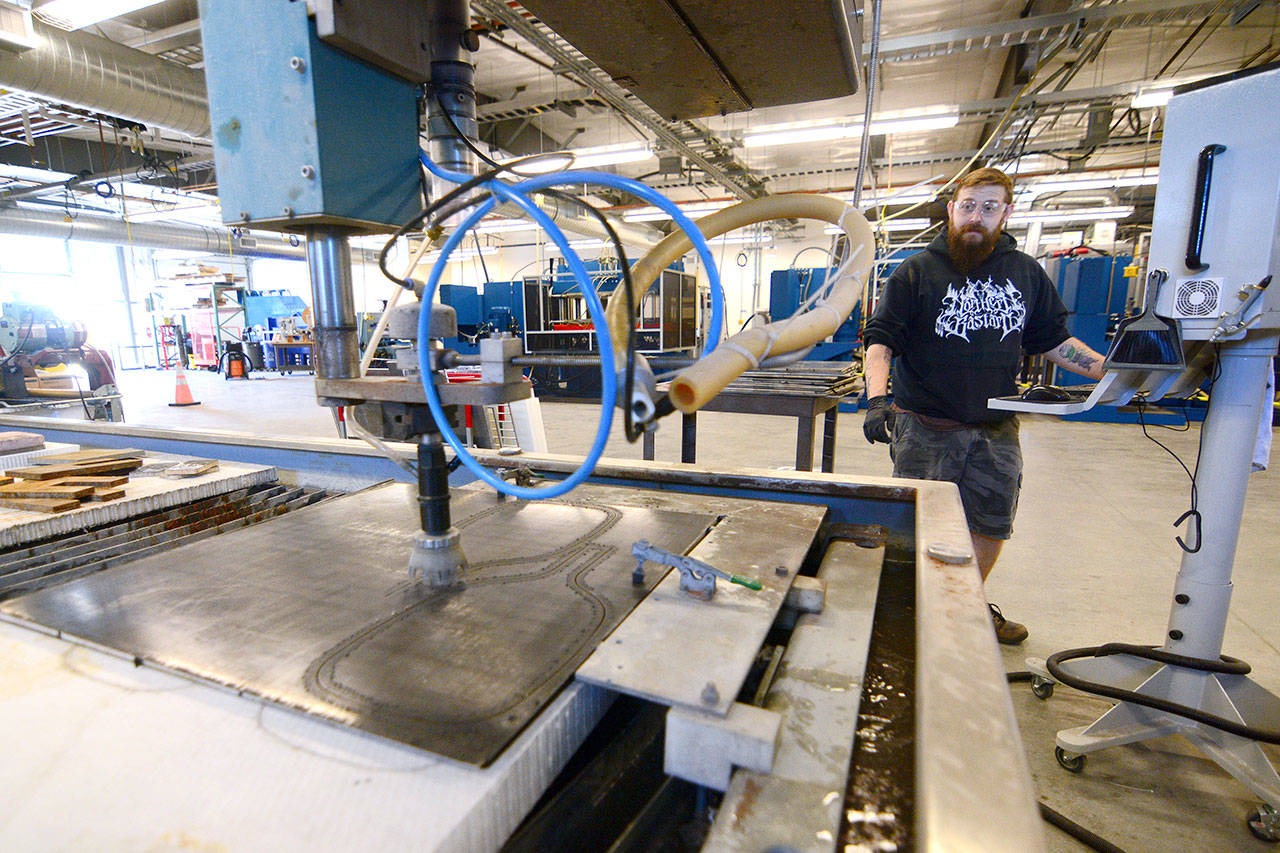PORT ANGELES — The Composite Recycling Technology Center is feeling pressure as it prepares its transition to being self-funded.
The CRTC’s success will be determined as it prepares to roll out four new products that will “make it or break it,” for the nonprofit, its CEO Bob Larsen told the Port of Port Angeles and Clallam County commissioners in a joint meeting Monday morning at the port offices.
He told the commissioners that should everything go as planned and the four products are successful, he is confident the CRTC — having been in its building for less than a year — will survive the transition.
In a later interview he said he gives the CRTC, which is so far mostly publicly funded, a 90 percent shot at making it.
The port, which committed $1.35 million to the CRTC in exchange for economic development, is nearing the end of that financial commitment.
“We know in January we’ll get our last support check from the port,” Larsen said. “The idea is we would be long enough along that we could stand on our own two feet.
“It looks like we have a chance to do that, but it might take a few months longer.”
That check has amounted to about $53,000 per month, he said. He told the commissioners it costs about $100,000 per month to keep the CRTC’s doors open, paying salaries and utilities.
That funding was matched by a $1.73 million grant by the state Department of Commerce, from its Clean Energy Fund 2 program, he said.
He said the CRTC is now looking at preparing a line of credit to make up the difference as sales begin for the four latest products early next year.
Among the key products is park benches, he said.
The city of Port Angeles provided $10,000 in seed money to pilot that project.
He said the city has shown interest in buying “a certain number” of benches from the CRTC, he said. The first two benches will be finished by the end of September and Larsen expects production to begin early next year. He said representatives of other cities in Western Washington have shown interest in the benches as well.
“We’re scheduled for production in the first quarter and we’ll do it sooner if we can,” he said.
The CRTC, which created the world’s first scrap aerospace-quality carbon fiber pickleball paddle, is preparing for another “breakthrough” sporting product he said.
The pickleball paddle hasn’t sold as expected, he said, adding it is competing against 150 other paddles on the market.
The latest sporting good, which Larsen declined to identify, has been designed and prototyped and is being tested in the field. He hopes to move toward production by the end of the month with it being for sale this fall.
He hopes to sell hundreds of the new product per month by the end of the year.
The CRTC is also preparing an industrial carbon-fiber brace and is delivering prototypes to a company this month, he said.
“It’s one of those bread and butter products that isn’t exotic or sexy, but it will generate income,” he said, adding it’s important to diversify the nonprofit’s products.
A fourth product includes a “major new sporting good” item, which will be prototyped in the third quarter of this year.
There are a number of other projects in the pipeline, including carbon-fiber car seat backs and other types of furniture, but those are further down the line, he said.
As the CRTC looks to increase its production capability, it is developing a machine to process the carbon fiber.
The CRTC recently announced a one-year $400,000 contract with the Institute for Advanced Composite Manufacturing Innovation that is helping fund the nonprofit’s efforts.
Larsen said with the transition approaching, that contract couldn’t have come at a better time.
The CRTC plans to double its staff from 17 to 34 by the end of 2018 and Larsen said he still feels the nonprofit can still reach its goal of eventually having 200 employees.
In addition to creating family-wage jobs locally, the CRTC’s goal is to divert 2 million pounds of carbon fiber composites from landfills and recycle at least 1 million pounds of carbon fiber scrap per year by 2022.
“We’re really grateful for the support we’ve had and we’re doing our best to live up to everyone’s expectations,” he said. “It’s not easy, but if it were easy someone else would have already done it.”
________
Reporter Jesse Major can be reached at 360-452-2345, ext. 56250, or at jmajor@peninsuladailynews.com.

